

AlphaLISA SureFire Ultra Human and Mouse Total Moesin Detection Kit, 500 Assay Points
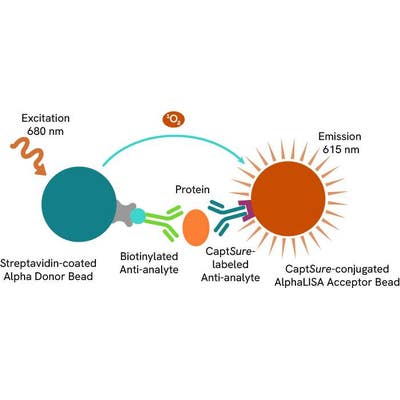

AlphaLISA SureFire Ultra Human and Mouse Total Moesin Detection Kit, 500 Assay Points
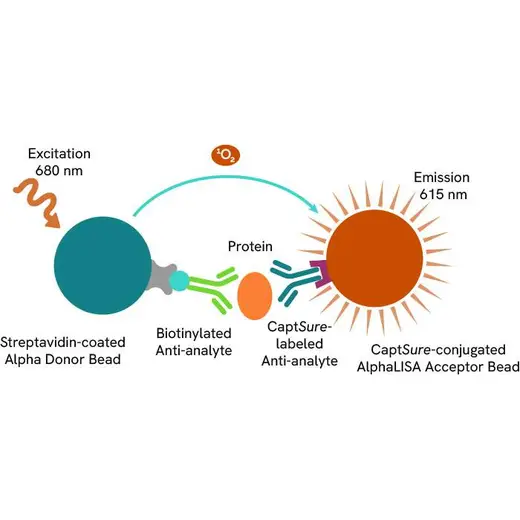


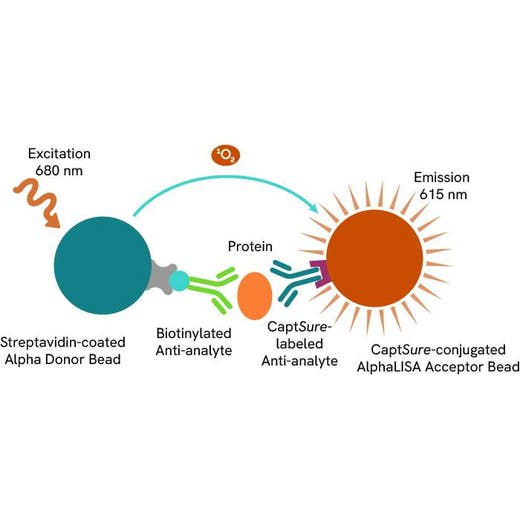


The AlphaLISA™ SureFire® Ultra™ Human and Mouse Total Moesin assay is a sandwich immunoassay for quantitative detection of total Moesin in cellular lysates using Alpha Technology.
| Feature | Specification |
|---|---|
| Application | Cell Signaling |
| Protocol Time | 2h at RT |
The AlphaLISA™ SureFire® Ultra™ Human and Mouse Total Moesin assay is a sandwich immunoassay for quantitative detection of total Moesin in cellular lysates using Alpha Technology.



AlphaLISA SureFire Ultra Human and Mouse Total Moesin Detection Kit, 500 Assay Points



AlphaLISA SureFire Ultra Human and Mouse Total Moesin Detection Kit, 500 Assay Points



Product information
Overview
Moesin, a member of the ERM protein family, links the actin cytoskeleton to the plasma membrane, playing an essential role in maintaining cell structure and signaling. Activated by phosphorylation at Thr558, Moesin facilitates interactions with actin filaments and membrane proteins. Upregulation of Moesin is associated with cancers like breast and colorectal cancer, promoting tumor growth and metastasis. Moesin also modulates immune cell functions, contributing to autoimmune conditions.
The AlphaLISA SureFire Ultra Human and Mouse Total Moesin Detection Kit is a sandwich immunoassay for the quantitative detection of total Moesin in cellular lysates, using Alpha Technology.
Formats:
- The HV (high volume) kit contains reagents to run 100 wells in 96-well format, using a 60 μL reaction volume.
- The 500-point kit contains enough reagents to run 500 wells in 384-well format, using a 20 μL reaction volume.
- The 10,000-point kit contains enough reagents to run 10,000 wells in 384-well format, using a 20 μL reaction volume.
- The 50,000-point kit contains enough reagents to run 50,000 wells in 384-well format, using a 20 μL reaction volume.
AlphaLISA SureFire Ultra kits are compatible with:
- Cell and tissue lysates
- Antibody modulators
- Biotherapeutic antibodies
AlphaLISA SureFire Ultra kits can be used for:
- Cellular kinase assays
- Receptor activation studies
- High-throughput screening for preclinical studies
Specifications
| Application |
Cell Signaling
|
|---|---|
| Automation Compatible |
Yes
|
| Brand |
AlphaLISA SureFire Ultra
|
| Detection Modality |
Alpha
|
| Protocol Time |
2h at RT
|
| Shipping Conditions |
Shipped in Blue Ice
|
| Target |
Moesin
|
| Target Class |
Phosphoproteins
|
| Target Species |
Human
Mouse
|
| Technology |
Alpha
|
| Therapeutic Area |
Autoimmunity
Oncology
|
| Unit Size |
500 assay points
|
Video gallery

AlphaLISA SureFire Ultra Human and Mouse Total Moesin Detection Kit, 500 Assay Points

AlphaLISA SureFire Ultra Human and Mouse Total Moesin Detection Kit, 500 Assay Points

How it works
Total-AlphaLISA SureFire Ultra assay principle
The Total-AlphaLISA SureFire Ultra assay measures the expression level of a protein target in a cell lysate.
The Total-AlphaLISA SureFire Ultra assay uses two antibodies which recognize two different distal epitopes on the targeted protein. AlphaLISA assays require two bead types: Acceptor and Donor beads. Acceptor beads are coated with a proprietary CaptSure™ agent to specifically immobilize the assay specific antibody, labeled with a CaptSure tag. Donor beads are coated with streptavidin to capture one of the detection antibodies, which is biotinylated. In the presence of targeted protein, the two antibodies bring the Donor and Acceptor beads in close proximity whereby the singlet oxygen transfers energy to excite the Acceptor bead, allowing the generation of a luminescent Alpha signal. The amount of light emission is directly proportional to the quantity of protein present in the sample.

Total-AlphaLISA SureFire Ultra two-plate assay protocol
The two-plate protocol involves culturing and treating the cells in a 96-well plate before lysis, then transferring lysates into a 384-well OptiPlate™ plate before the addition of Total-AlphaLISA SureFire Ultra detection reagents. This protocol permits the cells' viability and confluence to be monitored. In addition, lysates from a single well can be used to measure multiple targets.
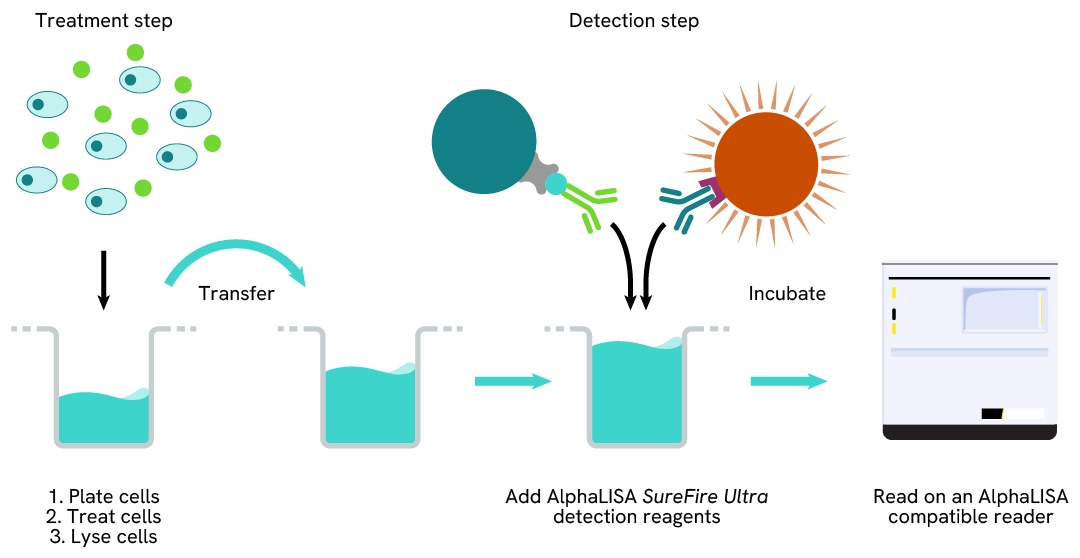
Total-AlphaLISA SureFire Ultra one-plate assay protocol
Detection of Total target protein with AlphaLISA SureFire Ultra reagents can be performed in a single plate used for culturing, treatment, and lysis. No washing steps are required. This HTS designed protocol allows for miniaturization while maintaining AlphaLISA SureFire Ultra quality.
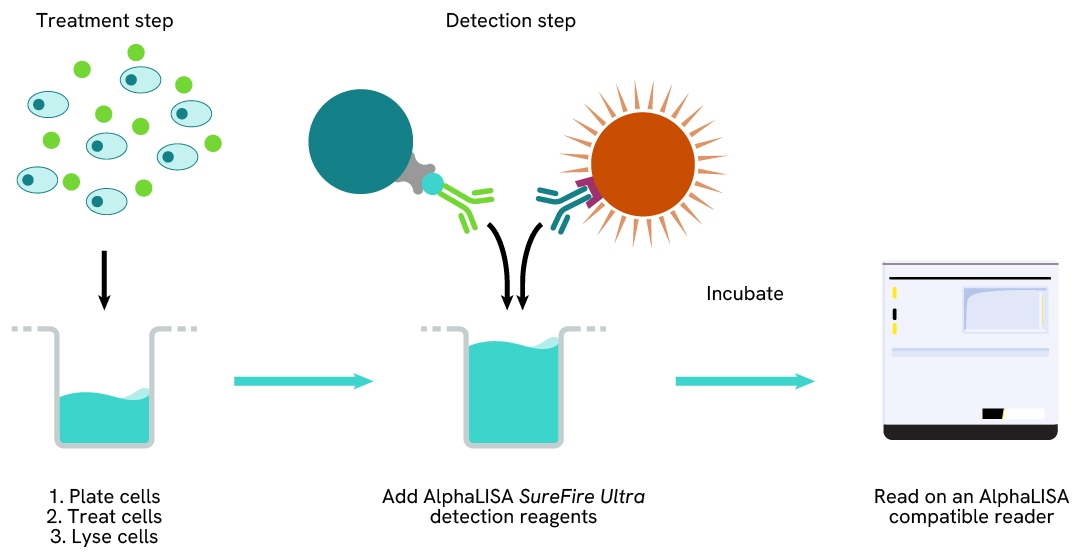
Assay validation
Validation of Phospho (Thr558)/Total Moesin in Calyculin A treated cells
HeLa cells were seeded in a 96-well plate (40,000 cells/well) in complete medium and incubated overnight at 37°C, 5% CO2. The cells were treated with increasing concentrations of Calyculin A for 1 hour.
After treatment, the cells were lysed with 100 µL of Lysis Buffer for 10 minutes at RT with shaking (350 rpm). Moesin Phospho (Thr558) and Total levels were evaluated using respective AlphaLISA SureFire Ultra assays. For the detection step, 10 µL of cell lysate (approximately 4,000 cells for Total and 400 cells for Phospho (lysates diluted 1:10)) were transferred into a 384-well white OptiPlate, followed by 5 µL of Acceptor mix and incubated for 1 hour at RT. Finally, 5 µL of Donor mix was then added to each well and incubated for 1 hour at RT in the dark. The plate was read on an Envision using standard AlphaLISA settings.
As expected, Calyculin A triggered a dose-dependent increase in the levels of Phospho Moesin (Thr558) while Total Moesin levels remained unchanged.

Validation of Phospho (Thr558)/Total Moesin levels in Staurosporine treated cells
A549 cells were seeded in a 96-well plate (40,000 cells/well) in complete medium, and incubated overnight at 37°C, 5% CO2. The cells were treated with increasing concentrations of Staurosporine for 1 hour.
After treatment, the cells were lysed with 100 µL of Lysis Buffer for 10 minutes at RT with shaking (350 rpm). Moesin Phospho (Thr558) and Total levels were evaluated using respective AlphaLISA SureFire Ultra assays. For the detection step, 10 µL of cell lysate (approximately 4,000 cells for Total and 1,000 cells for Phospho (lysates diluted 1:4)) were transferred into a 384-well white OptiPlate, followed by 5 µL of Acceptor mix and incubated for 1 hour at RT. Finally, 5 µL of Donor mix was then added to each well and incubated for 1 hour at RT in the dark. The plate was read on an Envision using standard AlphaLISA settings.
As expected, Staurosporine triggered a dose-dependent decrease in the levels of Phospho Moesin (Thr558) while no significant changes were observed for Total Moesin.

Specificity of Moesin Total assay
Specificity of the Moesin Total assay was assessed using Ezrin, Radixin and Moesin recombinant human proteins.
Recombinant Ezrin (Abcam, ab132943), Radixin (RayBiotech, 230-30097) and Moesin (RayBiotech, 230-30095) proteins were prepared at 0.5 µg/mL in Lysis Buffer. Moesin total levels were evaluated using the AlphaLISA SureFire Ultra assay. For the detection step, 10 µL of protein was transferred into a 384-well white OptiPlate, followed by 5 µL of Acceptor mix and incubated for 1 hour at RT in the dark. Finally, 5 µL of Donor mix was then added to each well and incubated for 1 hour at RT in the dark. The plate was read on an Envision using standard AlphaLISA settings.
As expected, Moesin Total assay reacts only to Moesin recombinant protein. This result demonstrates the specificity of the Moesin Total assay as these 3 proteins share more than 70% sequence identity.
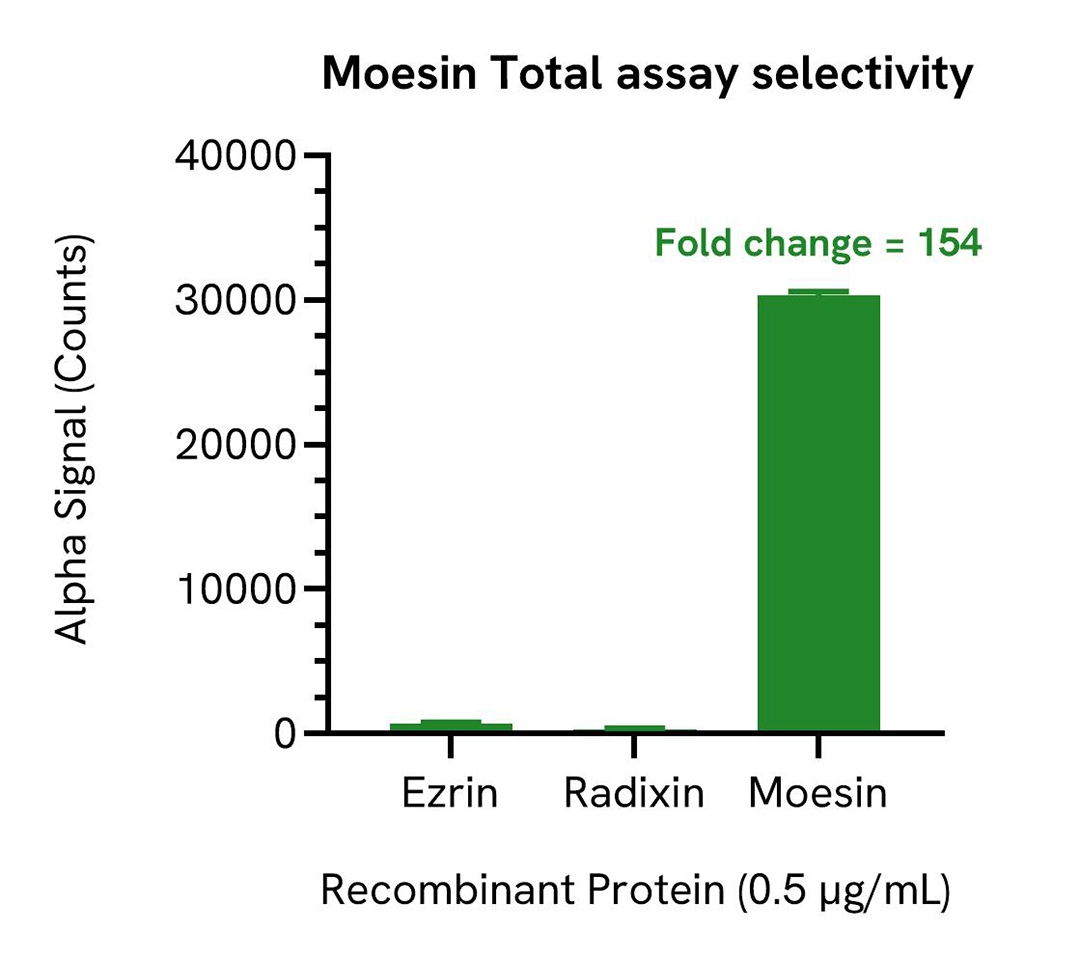
Specificity of Moesin Total assay
Specificity of Moesin Total protein levels were assessed in HeLa wild type (WT) and HeLa Moesin knockout (KO) cells. Both cell lines were grown to confluency in a T75 flask in medium at 37°C, 5% CO2. Cells were lysed in 3 mL of Lysis Buffer for 10 minutes at RT with shaking (350 rpm). Lysates were diluted 1:2 in Lysis Buffer and evaluated for Total Moesin using the AlphaLISA SureFire Ultra kit.
For the detection step, 10 µL of cell lysate (approximately 10,000 cells) was transferred into a 384-well white OptiPlate, followed by 5 µL of Acceptor Mix and incubated for 1 hour at RT. Finally, 5 µL of Donor Mix was added to each well and incubated for 1 hour at RT in the dark. The plate was read on an Envision using standard AlphaLISA settings.
As expected, Total Moesin was only detected in the WT HeLa cells but not in the HeLa Moesin KO cell line.

Versatility of Moesin Total assay in various cell lines
Human and mouse cell lysates were diluted with Lysis Buffer to represent approximately 10,000 cells/datapoint. Moesin Total levels were evaluated using the AlphaLISA SureFire Ultra assay kit.
For the detection step, 10 µL of cell lysate was transferred into a 384-well white OptiPlate, followed by 5 µL of Acceptor Mix and incubated for 1 hour at RT. Finally, 5 µL of Donor Mix was then added to each well and incubated for 1 hour at RT in the dark. The plate was read on an Envision using standard AlphaLISA settings.
Moesin Total protein expression is varied depending on cell type. Moesin protein is highly expressed in HeLa, THP-1, A549 and HUVEC cell lines, with low or no expression in MCF7, RT-4 and SH-SY5Y cell lines.

Resources
Are you looking for resources, click on the resource type to explore further.
The definitive guide for setting up a successful AlphaLISA SureFire Ultra assay
Several biological processes are regulated by...
Discover Alpha SureFire® Ultra™ assays, the no-wash cellular kinase assays leveraging Revvity's exclusive bead-based technology...
This document includes detailed tables listing HTRF™, AlphaLISA™ SureFire® Ultra™, and Alpha SureFire® Ultra™ Multiplex assays...
Loading...


How can we help you?
We are here to answer your questions.






























